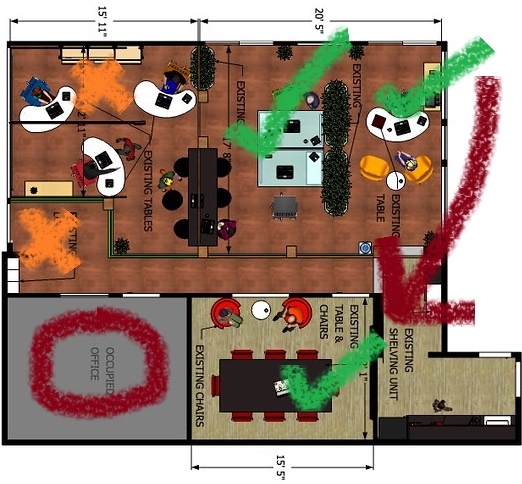The course includes lectures, workshop seminars, project work performed in groups, and examinations. Topics covered are planning processes, architectural drawings as documentation, laws and regulations, planning methods and design tools, and case studies
HN2024 Planning and Design of Physical Work Environments 7.5 credits

Information per course offering
Choose semester and course offering to see current information and more about the course, such as course syllabus, study period, and application information.
Information for Autumn 2026 Start 24 Aug 2026 programme students
- Course location
KTH Flemingsberg
- Duration
- 24 Aug 2026 - 11 Jan 2027
- Periods
Autumn 2026: P1 (4 hp), P2 (3.5 hp)
- Pace of study
25%
- Application code
10366
- Form of study
Normal Daytime
- Language of instruction
English
- Course memo
- Course memo is not published
- Number of places
Places are not limited
- Target group
- No information inserted
- Planned modular schedule
- [object Object]
- Schedule
- Schedule is not published
- Part of programme
- No information inserted
Contact
Course syllabus as PDF
Please note: all information from the Course syllabus is available on this page in an accessible format.
Course syllabus HN2024 (Autumn 2024–)Content and learning outcomes
Course contents
Intended learning outcomes
- Describe and discuss design projects, their management, and in which stages and contexts different sub-processes and methods are suitable.
- Describe and discuss the involvement of different stakeholders, their roles and political navigation in the planning process.
- Describe different methods, models and tools for planning.
- Choose and use relevant planning methods and models that are central for the course and reflect on their usefulness and relevance.
- Describe and discuss planning in practice.
- Give proposals of how to design workplaces and equipment in a practical case.
Literature and preparations
Specific prerequisites
At 180 ECTS credits, in technical, natural or medical sciences or in human resource studies. English B/English 6.
Literature
Examination and completion
Grading scale
Examination
- SEM1 - Seminars, 1.5 credits, grading scale: P, F
- PRO1 - Assignment Case Project, 3.0 credits, grading scale: P, F
- TEN1 - Examination, 3.0 credits, grading scale: A, B, C, D, E, FX, F
Based on recommendation from KTH’s coordinator for disabilities, the examiner will decide how to adapt an examination for students with documented disability.
The examiner may apply another examination format when re-examining individual students.
If the course is discontinued, students may request to be examined during the following two academic years.
Requirements for final grade:
Active participation in seminars and other exercises
Written and oral presentation of assignments
Finalize a case project
Examiner
Ethical approach
- All members of a group are responsible for the group's work.
- In any assessment, every student shall honestly disclose any help received and sources used.
- In an oral assessment, every student shall be able to present and answer questions about the entire assignment and solution.